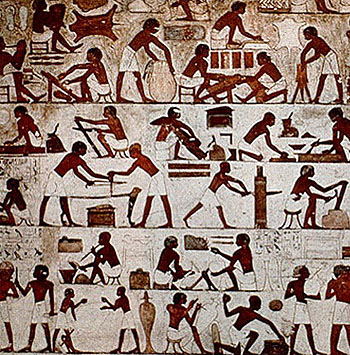 The specializations are almost endless--and, in fact, they continue to proliferate in our own times. The earliest were: baking, brewing, weaving, dyeing, carpentry, pottery-making, stone and metal-working, etc. Needs arise for merchants and soldiers and artists. Priests or shamans and healers had probably existed in the earlier hunter-gatherer societies, but knowledge of writing gave rise to a host of new specializations: estate or temple managers, literate bureaucrats, calendar-keepers, professional medical practitioners and teachers.
The specializations are almost endless--and, in fact, they continue to proliferate in our own times. The earliest were: baking, brewing, weaving, dyeing, carpentry, pottery-making, stone and metal-working, etc. Needs arise for merchants and soldiers and artists. Priests or shamans and healers had probably existed in the earlier hunter-gatherer societies, but knowledge of writing gave rise to a host of new specializations: estate or temple managers, literate bureaucrats, calendar-keepers, professional medical practitioners and teachers.
As technological specializations accumulated, the sum total of knowledge in the community soon exceeded the capacity of any individual mind. Specialized forms of knowledge were no longer sharable throughout the community, but instead became the "property" of special groups. The social egalitarianism of hunter-gatherer bands was very difficult to maintain in these new circumstances